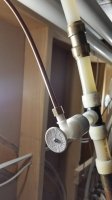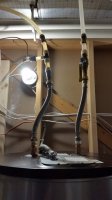DataDonkey
New Member
I just replaced my hot water heater. The new tank is a 80 gallon Westinghouse -- it ended up being 9" taller than my old one (which was also 80 gallon, but shorter and wider).
I figured I could do it myself. I consulted with some ppl and did a lot of research. Overall, things went well.
One snag was that I had to cut about 8" out of the Pex pipe in order for it to be able to connect the lines to the cold water inlet and hot water outlet properly. I used a hacksaw for that as I couldn't find a better way. Seemed to work fine. I used a Shark bit coupling to reconnect and it worked GREAT! No leaks at all.
We now have hot water again -- and my wife/kids are very happy.
The only remaining issue I have is the humidifier connection (see photo). Whenever I connect it to the Flow Tite valve it starts to leak. It seems to do this even when the valve is closed. If I connect the line and open the valve, I can hear the pressure build up but then it starts leaking. If I remove the line from the valve and close the valve, there is no leak from the valve itself.
This, it seems to me, might indicate that too much pressure is building in that line for some reason. The line itself connects to an Aprilaire humidifier on the furnace.
Any advice is greatly appreciated!
I figured I could do it myself. I consulted with some ppl and did a lot of research. Overall, things went well.
One snag was that I had to cut about 8" out of the Pex pipe in order for it to be able to connect the lines to the cold water inlet and hot water outlet properly. I used a hacksaw for that as I couldn't find a better way. Seemed to work fine. I used a Shark bit coupling to reconnect and it worked GREAT! No leaks at all.
We now have hot water again -- and my wife/kids are very happy.
The only remaining issue I have is the humidifier connection (see photo). Whenever I connect it to the Flow Tite valve it starts to leak. It seems to do this even when the valve is closed. If I connect the line and open the valve, I can hear the pressure build up but then it starts leaking. If I remove the line from the valve and close the valve, there is no leak from the valve itself.
This, it seems to me, might indicate that too much pressure is building in that line for some reason. The line itself connects to an Aprilaire humidifier on the furnace.
Any advice is greatly appreciated!


